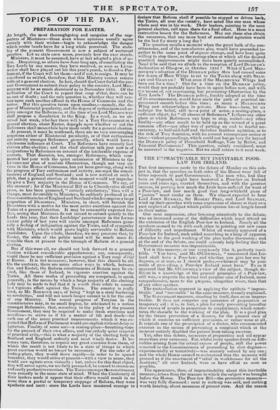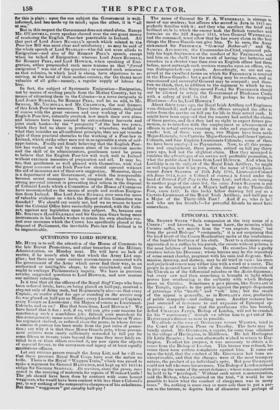THE re'PRACTICABLE BUT INEVITABLE POOR- LAW FOR IRELAND.
THE first impression made by the debate of Monday or. this sub- ject is, that the speeches on both sides of the House were full of bitter reproach to past Governments. The men who, had they been so disposed, might have bestowed a Poor-law on Ireland years and years ago, exerted themselves, and with the greatest success, in proving how much the Irish have suffered for want of a Poor-law, and how much good that long-withheld piece of
" justice" must confer on them. We almost expected to hear Lord JOHN RUSSELL, Sir ROBERT PEEL, and Lord STANLEY, wind up their speeches with some expression of shame at their own past neglect of a subject which public opinion has at length forced on their notice.
Our next impression, after listening attentively to the debate, was an increased sense of the difficulties which must attend on the extension of the English Poor-law to Ireland. Nearly all the speakers seemed to vie with each other in pointing out new cases of difficulty and impediment. Whilst all warmly approved of a Poor-law for Ireland. each added something to a heap of apparent obstacles to the good working of the plan under discussion ; and at the end of the debate, one could scarcely help feeling that the Government measure was impracticable.
Yet is this measure, or one very; nearly like it, perfectly inevi- table. " You have, said Mr. O'CONNELL, " announced that Ire-
land shall have a Poor-law; and whether you give her one by degrees, or at once, as 1 should prefer,—whatever may 'be your mode of prrueding, a Poor-law Ireland must have." To us it
appeared that Mr. O'CoNereee's view of the subject, though de- ficient in a knowledge of the general principles of a Poor-law, still was, es respects the actual and peculiar case of Ireland, more comprehensive, more to the turpose, altogether wiser, than that of any other speaker.
The contradiction apparent in applying the epithets " imprac- ticable and " inevitable " to the same measure, is easily explained.
The Government measure, standing by itself; does seem imprac- ticable. It does not comprise any measures of preparation or temporary aid : it is, in fact, a plan for only preventing hereafter
that excess of people in proportion to employment, which consti- tutes the obstacle to the working of the plan. It is a good plan
for the future prevention of a disease, for the present cure of which it contains no sufficient provisions, or rather none at all. It reminds one of the prescription of a doctor, who recommended exercise as the means of preventing a complaint which at the moment entirely disabled the patient from taking exercise. Yet, after this debate, measures of preparation and aid appear more than ever necessary. For, whilst every speaker dwelt on diffi- eulties arising from the actual excess of people, still the power reserved to the Commissioners of proceeding by slow degrees— experimentally or tentatively—was scarcely noticed by any one ; and the whole House seemed to understand that the measure will proceed as it' the enactment of "relief in workhouses for all the destitute," all over Ireland, were to have effect as soon as possible. The appearance, then, of impracticability about this inevitable measure, arises from the manner in which the subject was brought before the House. The Poor-law Bill—the preventive measure— was very fully discussed : next to nothing was said, and nothing worth hearing, about measures of present cure. And the reason
for this is plain : upon the one subject the Government is wt11- informed, and has made up its mind; upon the other, it is " all at sea."
But in this respect the Government does not stand alone. Except Mr. O'CONNELL, every speaker slurred over the one great means of rendering the English Poor-law practicable in Ireland. All that part of Lord JOHN RUSSELL'S speech which related to the Poor-law Bill was most clear and satisfactory ; as may be said of the whole speech of Lord STANLEY—Who did not even allude to Emigration—and also of Sir ROBERT PEEL'S speech, except when he talked of Emigration : whereas Lord JOHN RUSSELL, Sir ROBERT PEEL, and Lord Howlett, when speaking of Emi- gration, either propounded such mere truisms as that "forced emigration " was out of the question ; or asserted such nonsense as that colonies, in which land is cheap, have objections to re- ceiving, at the baud of their mother country, the (to them) most valuable of all gifts—namely, a regular supply of labour for hire.
In fact, the subject of Systematic Emigration—Emigration, not by means of sending people from the Mother Country, but by means of attracting them to the Colonies—is a terra incognita to Lord JOHN RUSSELL, Sir ROBERT PEEL, and let us add, to Mr. SENIOR, Mr. NICHOLLS, and Mr. CHADWICK, the real framers of this Irish Poor-law measure. These latter gentlemen, delighted of course with the great success and easy working of the new English Poor-law, naturally overlook how much their own plans and labours have been assisted by extraordinary harvests and joint stock banks—by the " prosperity " of the last two years, which they had no share in producing : wherefore, wedded to what they consider an all-sufficient principle, they are apt to make light of those practical obstacles to the working of a Poor-law in Ireland, which strike other men not in so agreeable a state of self- approbation. Fondly and firmly believing that the English Poor- law has worked so well by reason alone of its intrinsic merits and the skill of its administrators, gentlemen must be prone to believe that the English Poor-law will work well in Ireland without extrinsic measures of preparation and aid. It may be, too, that gentlemen so well pleased with themselves, wish that the great measure of an Irish Poor-law should succeed without the aid of measures not of their own suggestion. Moreover, there is a department of our Government, of which the irresponsible because secret managers have, or imagine that they have, a strong persona] interest in preventing that reform in the disposal of Colonial Lands which a Committee of the House of Commons have recommended as the means of ample and costless Emigra- tion frcm Ireland. Has Lord JOHN RUSSELL ever seen the mass of valuable evidence on which the Report of this Committee was founded ? We should say surely not, had we no reason to know that the Colonial Office have succesfully protested, with the Cabi- net, against any legislation upon this subject. So, because one Mr. STEPHEN (Lord Gseeteso and Sir GEORGE GREY being mere instruments in his hands) wishes to retain his own absolute con- trol over revenues which the Crown has specifically placed at the disposal of Parliament, the inevitable Poor-law for Ireland is to be impracticable.



























 Previous page
Previous page